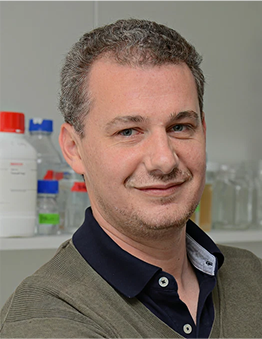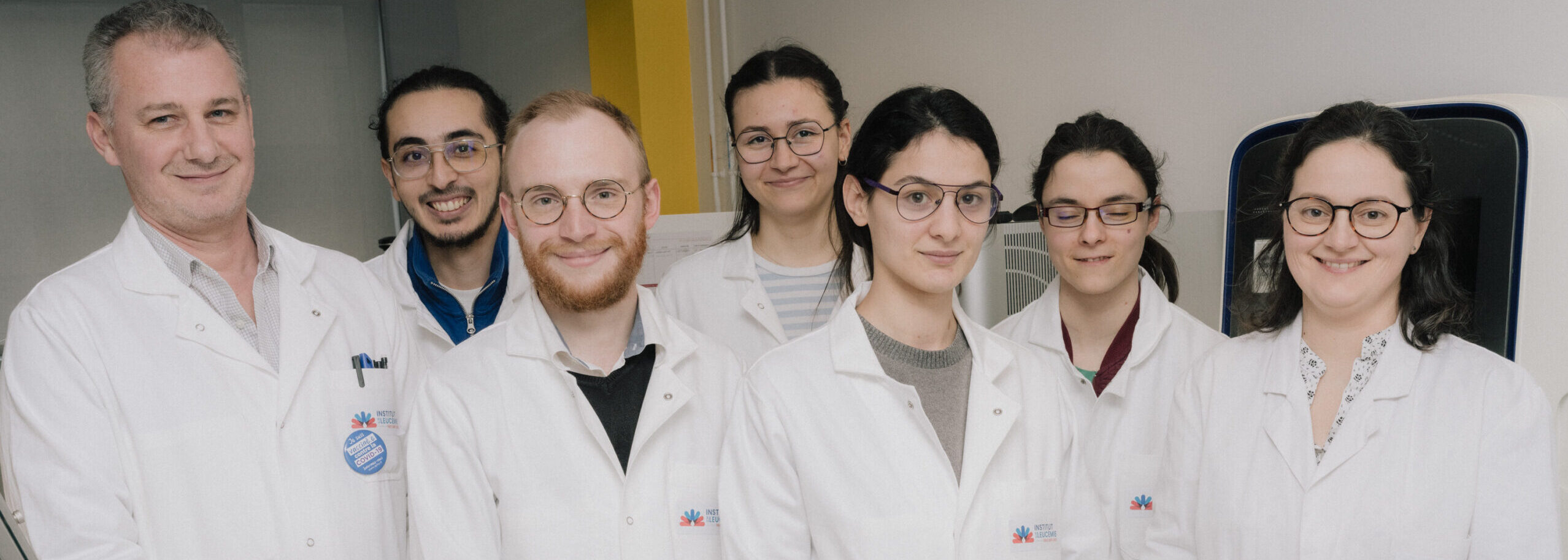- About us
- A new Institute dedicated to combating leukemia
- Scientific and medical program
- History of Hematology on the Saint-Louis Campus
- The Leukemia Institute’s governance
- Press
- Contact us
- Our news
- Profile of Valéria Bisio, Research Officer
- Creation of a Hemato-Oncogenetics Unit
- Profile of Alice Gros, a peer-support patient
- Winners of the Leukemia Institute’s first call for projects
- Profile of Julien Calvo, researcher
- Support us
- Join us
- You are
- Patients and relatives
- To receive care and support
- Become an expert patient
- Discover the Leukemia Institute
- Researchers
- Research
- Clinical trials
- Discover the Leukemia Institute
- Healthcare professionals
- Refer a patient
- Our clinical research
- Discover the Leukemia Institute
- Industry partners
- Discover the Leukemia Institute
- Translational research
- Donors
- Support us
- Discover the Leukemia Institute
- Care
- Patient care
- Being Treated at the Leukemia Institute
- Cancer treatments
- Supportive Care
- Open Multidisciplinary Meetings
- Our clinical services
- Saint-Louis Hospital – Department of adult hematology
- Saint-Louis Hospital – Hematology Transplant Unit
- Saint-Louis Hospital – Department of Pharmacology and Clinical Investigations
- Saint-Louis Hospital – Adolescent and Young Adult Unit
- Saint-Louis Hospital – Outpatient Hemato-oncogenetics Unit
- Saint-Louis Hospital – Department of senior hematology
- Robert-Debré Hospital – Department of pediatric hematology and immunology
- Necker Hospital – Department of Adult Hematology
- Cochin–Port Royal Hospital – Department of clinical hematology
- Avicenne Hospital – Department of clinical hematology and cell therapy
- Our medical laboratories
- Hematology Medical Laboratory, Michaela Fontenay
- Hematology Medical Laboratory, Jean Soulier
- Molecular Genetics Unit, Hélène Cavé
- Hematology Medical Laboratory, Vahid Asnafi
- Patient information
- Acute Myeloid Leukemias
- Acute Lymphoblastic Leukemias
- Myeloproliferative Neoplasms
- Myelodysplastic Syndrome
- Cancer treatments
- Supportive Care
- Psychological Support
- Research
- Our research teams
- Hugues de Thé’s team – Molecular pathology
- Raphaël Itzykson’s team – Functional precision medicine for leukemia
- Michaela Fontenay’s team – Normal and pathological hematopoiesis
- Françoise Pflumio’s team – Niche, Cancer, and Radiation in Hematopoiesis
- Sylvie Méléard’s team – Population Evolution and Interaction Particle Systems
- David Michonneau’s team – Translational Immunology in Immunotherapy and Hematology (TIGITH)
- Lina Benajiba’s team – Identification and targeting of extrinsic regulators of myeloid malignancies
- Karl Balabanian’s team – Lymphoid niches, Chemokines and Immuno-hematological syndromes
- Alexandre Puissant’s team – Molecular Mechanisms of Acute Myeloid Leukemia Development
- Stéphane Giraudier’s team – Chronic Myeloid Malignancies, Microenvironment & Translational Research
- Diana Passaro’s team – Leukemia & Niche Dynamics
- Camille Lobry’s team – Genetic and Epigenetic control of Normal and Malignant Hematopoiesis
- Jean Soulier’s team – Stem cell dysfunction and secondary AML
- Sylvie Chevret’s team – Biostatistics and clinical epidemiology
- Our technological platforms
- Our clinical research
Accueil Camille Lobry’s team – Genetic and Epigenetic control of Normal and Malignant HematopoiesisCamille Lobry’s team – Genetic and Epigenetic control of Normal and Malignant Hematopoiesis
...Camille Lobry
Team leader
Institut de recherche Saint-Louis
Research themes
AML is the most common acute leukemia diagnosed in adults and has a dismal overall survival with few targeted therapies. Non-coding regions in the genome play an important role in regulating gene transcription and encompass insulators, enhancers and non-coding RNA. Study of these regions could help decipher leukemogenic mechanisms and help design novel targeted therapies.
- AML : Acute Myeloid Leukemia
- sAML : Secondary Acute Myeloid Leukemia
- MDS : Myelodysplastic Syndromes
Research areas
Super Enhancers (SE) have been characterized as single or group of enhancers with unusual strong enrichment for binding of transcriptional co-activators and strong modifications of histone tails. Leukemic cells often present with altered gene expression patterns and enhancer usage compared to their normal counterparts. SE tend to be enriched around and control genes known to play oncogenic functions. Our results show that SE profiles and activity are depending on oncogenic lesions and particularly that fusion oncogenes can hijack genomic regions to create aberrant de novo SE inducing oncogenes upregulation. We use combinations of genome wide transcriptomic and epigenomic approaches together with high throughput screening technologies based on CRISPR/Cas9, shRNA and CRISPRi to interrogate SE functions and their importance in transcription regulation and leukemia progression.
Essential oncogenes and oncogenics programs, such as MYC, control metabolic gene expression in leukemic cells and induce metabolic shift or reprogramming during transformation and progression of the disease. Conversely, several epigenetic regulators depend on metabolic intermediates to perform their catalytic functions and metabolic dysregulations impact on gene expression programs in leukemic cells. Understanding this interplay could help identify novel vulnerabilities in leukemic cells. In collaboration with Puissant Lab we deploy state of the art in vivo and in vitro models combined with multi-omic characterizations to explore and decipher these intricate mechanisms.
With the advent of massively parallel sequencing and development of many multi-omics techniques, cancer research relies more and more on state of the art molecular biology and bionformatics analyses not easily accessible to regular biologists. Our team helps researcher design and perform classical omics techniques such as RNA-seq, scRNA-seq, ChIP-seq, ATAC-seq and high throughput screening using CRISPR/Cas9 or shRNA and designs standardized bioinformatics analysis pipelines to help researchers explore their data.
Camille Lobry's team members
Camille LobryResearch Director, Team LeaderSéverine LecourtResearch EngineerIsmail El-AzrakAssistant EngineerNaelle GuillonBioinformatics EngineerPaul-Arthur MeslinPhD Student in BioinformaticsChloé ZédouardPhD Student (Joint Supervision with Puissant Lab)Rayan DaherApprentice, M2 BioinformaticsRanya AlawadhiM2 StudentScientific publications
Paul-Arthur Meslin & al, NAR Genomics and Bioinformatics, 2024
PitViper: a software for comparative meta-analysis and annotation of functional screening dataRead the publicationAngela Su & al, Cancer Discov, 2020
The Folate Cycle Enzyme MTHFR Is a Critical Regulator of Cell Response to MYC-Targeting TherapiesRead the publicationSalima Benbarche & al, Science Adv, 2022
Screening of ETO2-GLIS2-induced Super Enhancers identifies targetable cooperative dependencies in acute megakaryoblastic leukemiaRead the publicationStay up to date by subscribing to the institute's newsletter
- Discover the Leukemia Institute
- Translational research
- Our clinical research
- Clinical trials
- Become an expert patient
- To receive care and support
- A new Institute dedicated to combating leukemia






